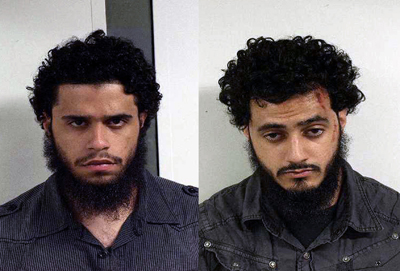
(RNS1-JUNE17) Carlos Eduardo Almonte, left, and Mohamed Mahmood Alessa, right, were arrested June 5 at New York’s John F. Kennedy International Airport on charges of conspiring to commit acts of terror abroad. The men were arrested after their families cooperated with law enforcement officials. For use with RNS-TERROR-FAMILIES, transmitted June 17, 2010. RNS photo courtesy U.S. Marshals Service, via The Star-Ledger.
NEWARK, N.J. (RNS) Wiretaps. Informants. Financial records. They all play vital roles in U.S. government investigations to prevent terrorist attacks.
But in the last six months, another investigative tool has received increased attention: cooperation from suspects’ families.
Three times since December — most recently on June 5, when two New Jersey men were apprehended at New York’s John F. Kennedy International Airport — authorities have made high-profile arrests in terror cases after receiving tips or other help from the suspects’ relatives.
The American Muslim community’s relationship with federal law enforcement has been turbulent at times since 9/11, and cooperation with authorities has been a sensitive subject, according to Muslim leaders.
At the same time, Muslims said they supported the decisions of the suspects’ families to help authorities.
“It’s actually our duty, because of the safety of our families, and our country, and the safety of our people here,” said Yaser El-Menshawy, president of the New Jersey Council of Mosques. “It’s more important than a stupid guy trying to do a stupid act.”
Police arrested Mohamed Mahmood Alessa and Carlos Eduardo Almonte at JFK as they were boarding a flight to Egypt. Authorities charged them with conspiring to commit acts of terror abroad, saying they planned to join a Somali terrorist group connected to al-Qaida.
Both men’s fathers greeted FBI agents during raids of their homes later that same day. Family members had reported their movements, secretly working with the FBI and state counterterrorism officials, according to officials involved with the case.
While both suspects are Muslim, only Alessa comes from a Muslim family; Almonte converted to Islam from Catholicism several years ago against his father’s wishes.
FBI officials do not discuss details of their dealings with informants. But Michael B. Ward, head of the FBI’s Newark division, said interaction between investigators and suspects’ relatives is not unusual, either during or after investigations.
“We don’t go in necessarily as adversaries,” Ward said. “We will talk to them, tell them, `This is why we’re here. This is what we have. This is what’s going to happen.’
“If you deal with people with respect and compassion, it’s appreciated,” he added.
Two other recent cases also involved family members.
On Christmas Day, Nigerian Umar Farouk Abdulmutallab was arrested after unsuccessfully trying to blow up a Northwest Airlines flight bound for Detroit. Weeks earlier, his father had contacted the U.S. Embassy in Nigeria to warn that his son’s Islamic beliefs had become “radicalized,” according to media reports.
Also in December, the FBI arrested five Virginia men in Pakistan after their families, concerned the men were going to join a terrorist group, alerted the Council on American-Islamic Relations. CAIR then persuaded the relatives to contact the FBI, said Ibrahim Hooper, a CAIR spokesman.
“It’s obviously difficult for the families in these situations,” Hooper said. “But when there was concern about potential wrongdoing, or at least suspicion of wrongdoing, they and we felt it was our duty to go to law enforcement authorities.”
Former state attorney general John Farmer Jr., who served as senior counsel to the 9/11 commission, said using family members as sources can be difficult, especially when the suspects face a stiff sentence if convicted.
“You’re almost providing a disincentive for future family members to come forward,” he said.
Of course, not every terrorist plot or jihadist aspiration raises alarms with the people around them. Many people with extreme views keep to themselves, said Imam Raouf Zaman of the Muslim Center of Middlesex County in Piscataway.
“It does not reach the ears of the majority of the community,” Zaman said.
Zaman said many mosque leaders would steer people away from radical beliefs if they become known. At the same time, he said, it could be difficult to determine who has become radicalized, saying people with extreme beliefs keep to themselves.
To Sameer Handan, a Kuwaiti immigrant who owns a deli next to the Al-Tawheed Mosque in Jersey City, the involvement of relatives in these investigations makes perfect sense.
“We didn’t come over here to destroy people and disrespect other people’s religions,” he said. “We came to work and to survive and appreciate the country. What we have here, our (Arab) presidents don’t give us.”
(Jeff Diamant and Chris Megerian write for The Star-Ledger. Ted Sherman contributed to this report.)




